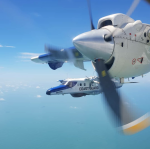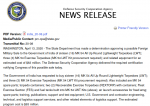Maritime Patrol Aircraft : P-8I Neptune, Dornier-228 : News & Discussions
- Thread starter Ashwin
- Start date
You are using an out of date browser. It may not display this or other websites correctly.
You should upgrade or use an alternative browser.
You should upgrade or use an alternative browser.
4th Il38SD which suffered damage during test flight in Russia is fully operational in Goa. And the 5th and last SD will be delivered within a month. Upgrade program is complete.
Expected to be replaced by next batch of P8I when they get ordered.
Expected to be replaced by next batch of P8I when they get ordered.
India’s Navy to Begin Receiving 4 More P-8I Neptune Maritime Patrol Aircraft in May
Delivery of the four P-8I maritime patrol aircraft is expected to be completed by January 2022.
By Franz-Stefan Gady
April 01, 2020

An Indian Navy P8I Poseidon conducts a low altitude fly by alongside a U.S. Navy guided-missile during a bilateral anti-submarine warfare exercise with the Indian Navy in the Indian Ocean, April 15, 2019.
Credit: U.S. Navy
The Indian Navy is slated to begin inducting four more Boeing P-8I Neptune advanced maritime patrol/anti-submarine warfare (ASW) aircraft this May, according to Navy sources.
This appears to confirm earlier reports this year that the first of the four aircraft will be delivered in the middle of 2020. “Based on the contract, the first of the four aircraft will be delivered in mid-2020 and the remaining three in 2021” a Boeing Spokesperson was quoted as saying by the Economic Times on February 17.
“These aircraft will also be in the same configuration as the earlier eight aircraft,” the Navy source was quoted as saying by The Hindu on March 18. “Plans are on to install encrypted communication systems on the earlier ones.”
The installation of encrypted communication systems on the U.S.-made aircraft is made possible by the signing of a Communications, Compatibility and Security Agreement (COMCASA) in September 2019.
“COMCASA allows the U.S. military to transfer secure communications and data equipment to India. Prior to the conclusion of the agreement, the United States had to remove advanced communication equipment from all military platforms sold to India such as the P-8I Neptune,” I explained previously. “Additionally, the United States had to place less secure temporary systems on Indian units so the two sides could communicate during bilateral exercises.”
According to the Indian Navy source, the service has already operationalized COMCASA and has exchanged information with the U.S. military. COMCASA reportedly allows P-8I and P-8A Poseidon aircraft, the U.S. Navy variant of the aircraft, to share real-time operational intelligence, including a secure Common Tactical Picture.
The Indian government and Boeing concluded a $2.1 billion contract for the purchase of eight P-8I aircraft in 2009 making India the first international customer of an export variant of the maritime patrol aircraft. The Indian Ministry of Defense (MoD) placed a $1.1. billion follow-on order for four additional P-8Is in 2016. The Indian MoD approved the procurement of 10 more P-8Is in June 2019. As I explained previously:
The Indian Navy’s P-8I squadron (Indian Naval Air Squadron 312A) operates out of the Indian naval air station Rajali in southern India.
India’s Navy to Begin Receiving 4 More P-8I Neptune Maritime Patrol Aircraft in May
Delivery of the four P-8I maritime patrol aircraft is expected to be completed by January 2022.
By Franz-Stefan Gady
April 01, 2020

An Indian Navy P8I Poseidon conducts a low altitude fly by alongside a U.S. Navy guided-missile during a bilateral anti-submarine warfare exercise with the Indian Navy in the Indian Ocean, April 15, 2019.
Credit: U.S. Navy
The Indian Navy is slated to begin inducting four more Boeing P-8I Neptune advanced maritime patrol/anti-submarine warfare (ASW) aircraft this May, according to Navy sources.
This appears to confirm earlier reports this year that the first of the four aircraft will be delivered in the middle of 2020. “Based on the contract, the first of the four aircraft will be delivered in mid-2020 and the remaining three in 2021” a Boeing Spokesperson was quoted as saying by the Economic Times on February 17.
“These aircraft will also be in the same configuration as the earlier eight aircraft,” the Navy source was quoted as saying by The Hindu on March 18. “Plans are on to install encrypted communication systems on the earlier ones.”
The installation of encrypted communication systems on the U.S.-made aircraft is made possible by the signing of a Communications, Compatibility and Security Agreement (COMCASA) in September 2019.
“COMCASA allows the U.S. military to transfer secure communications and data equipment to India. Prior to the conclusion of the agreement, the United States had to remove advanced communication equipment from all military platforms sold to India such as the P-8I Neptune,” I explained previously. “Additionally, the United States had to place less secure temporary systems on Indian units so the two sides could communicate during bilateral exercises.”
According to the Indian Navy source, the service has already operationalized COMCASA and has exchanged information with the U.S. military. COMCASA reportedly allows P-8I and P-8A Poseidon aircraft, the U.S. Navy variant of the aircraft, to share real-time operational intelligence, including a secure Common Tactical Picture.
The Indian government and Boeing concluded a $2.1 billion contract for the purchase of eight P-8I aircraft in 2009 making India the first international customer of an export variant of the maritime patrol aircraft. The Indian Ministry of Defense (MoD) placed a $1.1. billion follow-on order for four additional P-8Is in 2016. The Indian MoD approved the procurement of 10 more P-8Is in June 2019. As I explained previously:
The P-8I is equipped with some of the most modern U.S. anti-submarine warfare (ASW) technology including a Telephonics APS-143 OceanEye aft radar system and a cutting-edge magnetic anomaly detector The APS-143 is not present on the original P-8A Poseidon in use by the U.S. Navy.
The aircraft is also armed with U.S. weapons systems including Harpoon Block-II missiles, [and] MK-54 lightweight torpedoes [next to others]. The aircraft are all data-linked with Indian submarines in order to have the capability to pass on information about enemy vessels.
The aircraft is also armed with U.S. weapons systems including Harpoon Block-II missiles, [and] MK-54 lightweight torpedoes [next to others]. The aircraft are all data-linked with Indian submarines in order to have the capability to pass on information about enemy vessels.
The Indian Navy’s P-8I squadron (Indian Naval Air Squadron 312A) operates out of the Indian naval air station Rajali in southern India.
India’s Navy to Begin Receiving 4 More P-8I Neptune Maritime Patrol Aircraft in May
Wow. So it's going to be 2.5 Harpoons & 4 torpedoes per aircraft. Sounds cheerful. If that's exhausted in an engagement, then all those aircrafts will do is grin & bear it.Weapons package for 4 P8I received FMS approval. 10 Harpoon missiles and 16 MK54 torpedoes.
21 Harpoons and 32 MK54 were bought for first 8 P8I.
More MK54s will be procured.Wow. So it's going to be 2.5 Harpoons & 4 torpedoes per aircraft. Sounds cheerful. If that's exhausted in an engagement, then all those aircrafts will do is grin & bear it.
Cannot say the same about Harpoon. Maybe NSM finds its way to our P8I too. Then NSMs will be ordered.
You yourself mentioned that for the first lot of 8 only 21 harpoons were procured. What exactly is the function of those harpoons? Seems that the IN is procuring them more for show. And P-8i are supposed to be our front line ASW platforms against the PLAN.More MK54s will be procured.
Cannot say the same about Harpoon. Maybe NSM finds its way to our P8I too. Then NSMs will be ordered.
We had bought some Harpoon block 2 for 12 Jaguars too. They too might find their way into Navy's hands once Jaguars are gone.You yourself mentioned that for the first lot of 8 only 21 harpoons were procured. What exactly is the function of those harpoons? Seems that the IN is procuring them more for show. And P-8i are supposed to be our front line ASW platforms against the PLAN.
But imo, due to limited funds, we are first procuring platforms and then gradually adding weapons. Even for the MH60R deal, we have only ordered training equipment for NSM missile. Not actual missiles.
Plus with a seperate Coastal Anti Ship Missile project to be undertaken, and having Brahmos on our ships, i think considering PN and PLAN surface assets in IOR, we might have a good anti ship inventory.
Where we lack is cheaper land attack (air/surface/submarine launched) cruise missiles. We need to fill in that void
Wow. So it's going to be 2.5 Harpoons & 4 torpedoes per aircraft. Sounds cheerful. If that's exhausted in an engagement, then all those aircrafts will do is grin & bear it.
Submarines cant fight back ...if you detect it at most u need 1 or max 2 torpedoes to sink it.48 torpedoes are thus enough to sink 24-48 submarines,because you dont need numbers to saturate enemy defenses.24-48 submarines is pretty much the whole PN sub fleet plus whatever PLAN can put on short notice into IOR.(most diesel subs of PLAN cant operate in IOR in meaningful way)Thus torpedo numbers are optimum.
The harpoons here are not for attacking heavy ships with long range SAM protection,but picking off isolated light ships like frigates on ASW duty,or fleet tankers/support ships,trade oil tankers and also targeting any suspicious ship in the deep high seas away from coast guard's reach.It simply gives a generic anti ship capability to the poseidon.
Western munitions generally have a long shelf life so you dont have to replace them often(AMRAAM and MICA 20 years against r-77 10 years for example),one of the reasons for their cost,other being higher manufacturing costs.
Modern submarines are also reported to have limited AD capabilities. I doubt whether these are present in the forth coming subs to be inducted in the PN & PLAN but I've no doubt that going ahead these would be standard features with any sub & that expecting the PN & the PLAN to have such features during their MLUs shouldn't be ruled out.Submarines cant fight back ...if you detect it at most u need 1 or max 2 torpedoes to sink it.48 torpedoes are thus enough to sink 24-48 submarines,because you dont need numbers to saturate enemy defenses.24-48 submarines is pretty much the whole PN sub fleet plus whatever PLAN can put on short notice into IOR.(most diesel subs of PLAN cant operate in IOR in meaningful way)Thus torpedo numbers are optimum.
Moreover, however sophisticated a torpedo, is it a given that they'd be in a position to sink any sub with 2 torpedoes ? Let's not underestimate the defensive measures deployed by subs to counter such attacks.













